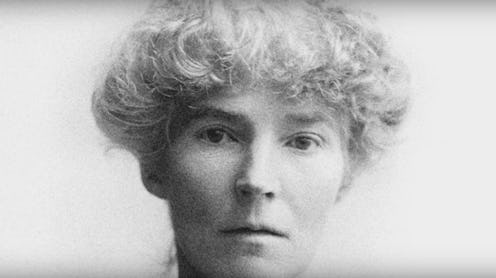Entertainment
'Letters From Baghdad' Is An Eye-Opening Feminist Documentary
Lately, Gertrude Bell has been having something of a resurgence. Two films coming out are dedicated entirely to the British traveler's revolutionary work in the Middle East at the turn of the century: Queen of the Desert, which stars Nicole Kidman as Bell, and Letters From Baghdad, a fascinating documentary all about Bell's refusal to let gender define her during her political pursuits. With Tilda Swinton giving a voice to Bell's letters, sent from various regions of the Middle East, Letters From Baghdad is at once a biography of a life previously unknown and an intimate portrait of a woman who did not see the benefit in living a safe or boring life simply because of the constraints around her gender.
You may not have heard of Bell until now, but her life and contributions were enormously important. Born into wealth in England, Bell was one of the first women to secure a first in history at Oxford at a time when women were rarely allowed into university. She learned Persian and Arabic in order to better assimilate into life in the Middle East, a region she knew she wanted to live and work in following a visit to Iran in her 20s. She never married, but wrote volumes upon volumes of books about the tribes and culture of the Middle East, and she played a role in the reconstruction of the region in the aftermath of World War I. In short: Bell was a badass, and Letters From Baghdad, out June 2, gives her story a platform.
The documentary touches on the incredible highlights on Bell's lifetime, using her correspondences as the primary script while also using dramatized reenactments of secondary accounts of Bell's work and life from the people who knew her (for example, Lawrence of Arabia author T.E. Lawrence appears as a talking head as he describes his somewhat sexist opinion of Bell's work). In this narrative construct, we get an intimate view of Bell's life, and she makes it clear in her correspondences that her attachment to the Middle East is profound. She doesn't feel homesick for England; instead, her correspondences indicate she feels as if she has arrived at the place she was always meant to be.
Letters From Baghdad also intricately and delicately explores how Bell's gender figures into this conversation. Her political work was extraordinary, especially for a woman at the time bound by sexist societal constraints, and she didn't let any "rules" of what a woman should be get in the way of her study and interaction with the people of the Middle East. She faced serious gender-based challenges; her writing, for instance,, which focused on the cultures of the region, was deemed potentially suspicious by the Ottoman Empire, due to the fact that she'd managed to gain access to the tribes as a woman.
Interestingly, though, Bell's letters rarely indicate any incredulousness at her ability to break stereotypes in a world that was so deeply gendered. She appears to have never questioned her merit because of her gender, nor did she ever feel the need to beat herself down or feel ashamed because of how far she went in her political, literary, and sociological ambitions. This is what makes Letters From Baghdad and Bell's life on the whole so interesting. She simply didn't live like her being a woman was a barrier to the great life she wanted to have, and that attitude makes her even more of an iconic figure than people already knew she was prior to the documentary.
